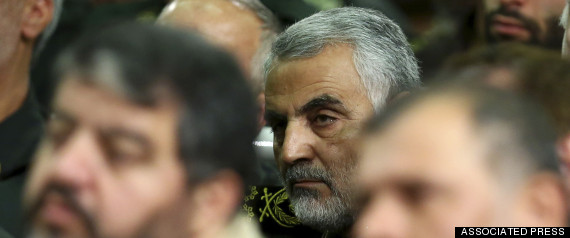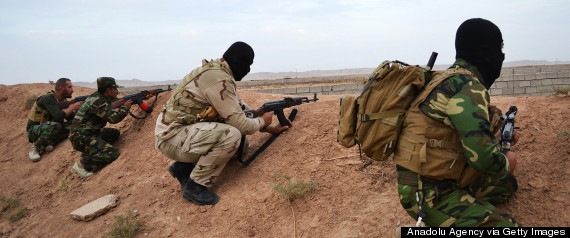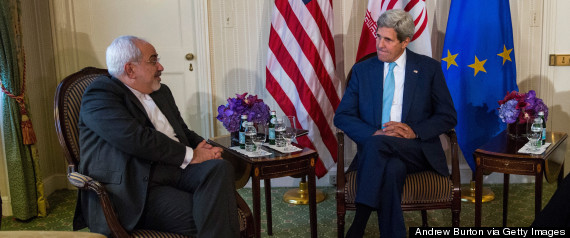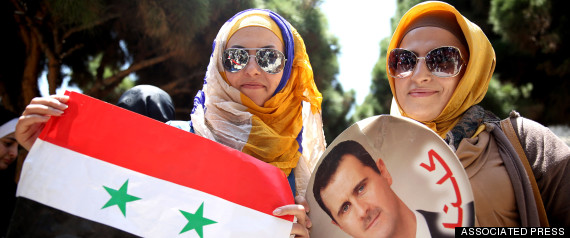WASHINGTON -- The Islamic Republic of Iran would like to make one thing clear: We've got this.
Up until June 10, Iranian officials had been content to shape events in Iraq quietly through their hold on local Shiite militias and the prime minister at the time, Nouri al-Maliki.
Then the Iraqi government lost Mosul, the nation's second-largest city, to the growing Sunni extremist force now known as the Islamic State, or ISIS. The U.S. eventually responded: It forced a new government to take power, sent in airpower and military advisers, and launched an international effort against ISIS in both Iraq and Syria.
But months before the U.S. showed that it was willing to invest heavily in the region again, Iran decided the rise of ISIS gave it the chance to stop being coy about its control of the Iraqi government.
The Iranian influence has only grown more visible now that the U.S. is embroiled in Iraq again. Control of the critical Interior Ministry was awarded last month to a representative of the Badr militia, one of the top Iranian proxies in Iraq.
The picture above shows Badr's leader, Hadi al-Amiri, chuckling with General Qassem Suleimani, the commander of Iran's internationally oriented paramilitary Quds Force. The publication of the photograph is a signal from Iran of just how powerful it is in Iraq, a high-ranking U.S. official said. Iran is embracing the Iraqi government and the Shiite militias.
A reporter for Iran's semi-official Tasnim News Agency helped spread the photograph on Twitter.
The U.S., meanwhile, is still developing its policy against ISIS -- and it knows, according to administration officials, Syrian opposition figures and outside analysts interviewed by The Huffington Post, that as a latecomer to the game, it has entered an arena in which Tehran's rules dominate.
Suleimani, a favorite of Iran's Supreme Leader, Ayatollah Ali Khamenei, plays a big part in setting those rules. He was given the star treatment in The New Yorker last year for his activities in Syria. Once reclusive, Suleimani has become increasingly visible in Iranian reports of triumph against ISIS, potentially to reaffirm his stature at home in the face of regional chaos.
Iran was ready to face down ISIS with the help of allies it has cultivated for years: the regime of Syrian President Bashar Assad, supplemented by the Iranian-aided Lebanese militant organization Hezbollah and the intensely brutal Shiite militias of Iraq.

Suleimani at a meeting with Iran's Supreme Leader, Ayatollah Ali Khamenei, in Tehran in 2013. (AP Photo/Office of the Iranian Supreme Leader, File.)
While the U.S. worked slowly after the ISIS takeover of Mosul in June, Suleimani and his government wasted no time.
Within 48 hours, Iran had sent senior advisers, weapons, ammunition and critical intelligence to the beleaguered Baghdad government, Iraqi government officials recently told the Financial Times.
"We had to defend ourselves,” Gen. Qassem Atta, the head of the Iraqi National Intelligence Service said, noting that his government had sought U.S. aid but had been rebuffed. "We had no choice ... but to go to Iran."
In a surreal turn of events for two countries that have not had diplomatic relations since 1979, the U.S. and Iran are seeing their interests align: Both support the central Iraqi government and the Kurds in the north, and both hope to eradicate ISIS.

Kurdish peshmerga forces and Shiite Badr militia fighters take positions against ISIS 55 miles south of Kirkuk, Iraq, on Oct. 30. (Ali Mukarrem Garip/Anadolu Agency/Getty Images)
But for Iran, the U.S. may be the enemy of its enemy, but it is no friend. Until just a few years ago, Iraqi Shiite militias under the influence of Iran were routinely shellingBaghdad's heavily guarded Green Zone.
The area was and remains home to the largest U.S. embassy in the world and to much of the Iraqi government.
On Oct. 1, four mortars landed in the Green Zone. Their source was unknown, and the Islamic State was quick to claim that it was behind the attack. But to U.S. officials, the incident seemed eerily familiar.
The possibility that those four shells could become 400 or 4,000 is at the forefront of U.S. policymakers' minds as they craft strategy in Iraq and Syria, administration officials have told The Huffington Post. The shells are a significant threat in themselves, but they also represent the broader fear Iran will use the militias to harm U.S. troops now being sent to Iraq as advisers.
Because of the Shiite militias' effectiveness against ISIS -- they have been instrumental in the Iraqi government's efforts to retake territory -- and the risk that they will turn on the U.S., the administration is loath to confront them or their Iranian backers directly.
This is why the purest expression of the dilemma facing the U.S. strategy is contained in the Suleimani-al-Amiri photo. An administration official told The Huffington Post it was taken just after Shiite militias, some Iraqi military personnel and Iranian fighters swept through southern Baghdad, demolishing houses and bringing the hammer down in Sunni areas. It was a good day for Iran and its Iraqi partners -- and not such a good day for Sunni-Shiite relations.
The Suleimani photo illustrates how the two major goals of the U.S. -- militarily defeating the Islamic State and bringing political reconciliation among Sunnis and Shiites -- require distinct strategies that run counter to each other.
In order to roll back ISIS, a Sunni militant group, the U.S. is essentially working alongside Iranian-backed Shiite militias. The only way those militias can win is ugly, as Amnesty International has documented and U.S. officials know -- and their behavior undermines any chance at reconciliation with Iraq's Sunnis.
Winning those Sunnis over from ISIS is key, U.S. officials say. The Sunnis provided critical support for the extremist group earlier this year, helping it overwhelm the Iraqi army because of their own dissatisfaction with the Shiite-run central government.
A video that purports to show Suleimani, the Iranian general, celebrating a victory against ISIS with Shiite militia fighters in Iraq. The video reportedly went viral at the State Department.
Analysts and officials have indicated recently that Iranian influence on U.S. policy has grown because the Obama administration wants to keep Tehran happy so it can reach a deal on its nuclear program. Former Obama Syria adviser Frederic Hof, now a fellow at the Atlantic Council, suggested in a blog post Wednesday that this concern may be behind "the virtual erasure of Syria" from the administration's latest rhetoric about the ISIS fight. Hof told The Huffington Post in an email that the administration started to see Iran, rather than Russia, as the key player in Syria just last year. Now, he said, "Iran's support for the regime is critical" for Assad's survival.
Keen to undermine ISIS in Iraq and Syria and to present a final resolution to the global panic over a potential Iranian nuclear weapon as negotiators seek a deal before a Nov. 24 deadline, the White House reportedly has assured Iran it will respect its interests in both countries where the U.S. is currently bombing ISIS -- defining the broad lines of the U.S. involvement in ways acceptable to Iran.
In Iraq, that means accepting the power of the Shiite militias and, according to administration officials quoted in the Wall Street Journal, passing messages to Tehran through Baghdad.
In Syria, that means promising not to bomb Assad's forces to ensure that no harm comes to the Iranian officers aiding them, the WSJ heard from officials. The administration is therefore in the difficult position of explaining to U.S.-backed Syrian moderate rebels that it is unlikely to help them against Assad, who they see as their main foe.
Congressional staffers were briefed this week on a new report about Iran's aggressive role in Syria, The Huffington Post has learned. Iran skeptics on Capitol Hill may use the report to demand that the administration get tougher on Tehran.
The White House has publicly denied any cooperation with Iran in the ISIS fight. But Press Secretary Josh Earnest said earlier this month that the two countries had discussed their respective battles against the group.
"We won't share intelligence with them, but their interest in this outcome is something that's been widely commented upon and something that on a couple of occasions has been discussed on the sidelines of other conversations," Earnest said, after the WSJ revealed that Obama had sent a letter to Iran's Supreme Leader Ayatollah Ali Khamenei in October that tied the nuclear negotiations to the Islamic State fight.

Secretary of State John Kerry (R) with Iranian foreign minister Mohammad Javad Zarif (L) on Sept. 26 in New York City. Along with representatives from Russia, China and the European Union, Kerry is leading the international community's negotiations with Iran over its nuclear program. The current deadline for a final deal is Nov. 24. (Andrew Burton/Getty Images)
Alistair Baskey, a spokesman for the White House's National Security Council, noted that Iraq remains a sovereign country and that Iranian influence there should not be overstated.
The relationship between the U.S. and the Iraqi government "speaks for itself, and is not one we calibrate in response or reaction to Iraq’s relationship with other regional actors," Baskey said in an email to The Huffington Post.
"As for Iran’s activities in Iraq, it is Iran’s choice as to whether it will step up and play a constructive role in the region, which we and the international community have consistently urged," he continued. "Alternatively, Iran’s leaders can choose to continue to contribute to the current instability by backing illegal militias in Iraq and elsewhere in the region, actions that have contributed significantly to the sectarian conflict that helped make Iraq so vulnerable over the past several years."
Of course, that group of "illegal militias" includes the one that dominates Iraq's Interior Ministry.
#Iraq Wonder who's back! New set of pics of H. Qassem Soleimani with Hadi Al Amiri (Badr SG) and Sh. Adnan Shahmani 1
|
More photographs claiming to show Suleimani, the Iranian general, with al-Amiri of the Badr militia, which runs Iraq's Interior Ministry, and Adnan Shahmani, a parliamentarianlinked to a militia associated with the Tayyar al-Rasuli political party.
Some foreign policy experts suggest the U.S. could just embrace Iran as a partner in this fight.
"Now is not the time for false virtue or moral absolutism. The working principle now has to be first threats first. And the first threat to American interests today is ISIS and its cohorts," Lesie Gelb, the former president of the Council on Foreign Relations,wrote last month in a Daily Beast essay supporting U.S. cooperation with Iran and Assad.
But strategic and diplomatic concerns -- chiefly the fact that Iran is the biggest security concern for most traditional U.S. allies in the Middle East, from Israel to the Sunni states helping fight ISIS -- mean that cooperation with Iran simply is not feasible, analysts told The Huffington Post.
Iran itself has no interest in serving U.S. purposes in the region. It still sees Washington as a rival with excessive regional influence that is more dangerous than ISIS. The role it played in helping eject the U.S. from Iraq earlier this decade is among its proudest achievements, and not one it wants to see rolled back with increased U.S. troop presences.
"What you have is a very temporary arrangement of convenience, and it is one where the longer-term objectives are fundamentally different," said Anthony Cordesman of the Center for Strategic and International Studies. He said the administration faces "the strange dichotomy" of dealing with ISIS alongside Iran at one end of the Middle East, and protecting its Arab allies from an Iranian military build-up in the Persian Gulf at the other.
Joshua Landis, the director of the Center for Middle East Studies at the University of Oklahoma and the founder of the Syria Comment blog, said the U.S. dilemma is particularly complex because compromise with Iran's regional allies to focus on the ISIS threat means different things in different arenas.
"In Iraq, the United States has a partner, because it's not ashamed, it's not afraid to work with the sectarian Shiite government, because 60 percent [of Iraq] is Shiite," Landis told The Huffington Post. "Even if they're as brutal as Assad, America can say they're the majority. In Syria, they can't. They've demonized Assad and there's been such a bloody civil war, so they can't back him up."
Landis added that he believes this is why the administration has pursued what it describes as an "Iraq first" policy.
Speaking at the G-20 summit earlier this month, Obama underscored his opposition to Assad but said the administration is not presently discussing ways to remove him.

Two Syrian women who live in Iran hold their country's flag and a picture of Syrian President Bashar Assad after casting their votes for their country's presidential election at the Syrian Embassy in Tehran, Iran, Wednesday, May 28. Though he has been blasted by the international community, Assad retains support among some Syrians, particularly those who belong to the same Alawite sect of Shiite Islam. (AP Photo/Ebrahim Noroozi)
Analysts and Syrian opposition figures warn against a conciliatory approach toward Iran, even if it might be the most pragmatic option given the looming deadline for a nuclear deal. They say the U.S. may end up doing Tehran's dirty work for it: If Washington does not plan for what it wants left behind after ISIS, it could simply be removing the most powerful Sunni rival to Iran's proxies.
Iran's established influence in the region could therefore guarantee its ability to hold sway -- including in ways that could feed further Sunni extremism -- long after the U.S. loses interest in the fight there, according to Joseph Bahout, a visiting scholar at the Carnegie Endowment for International Peace and a former French government adviser.
Tehran's thinking, Bahout told The Huffington Post, is likely that "Syria has become such a mess and we have enough cards among these sectarian militias, Iraqi and Lebanese, that we can transform [the region] into a quagmire of open low-intensity fighting for years…[and] sink our adversaries."
And that might be just fine for Suleimani and the forces he leads. His Iranian Revolutionary Guards Corps is heavily involved in the Iranian economy -- and for them, reconciliation with the West and the subsequent opening of the Iranian economy would be bad for business.